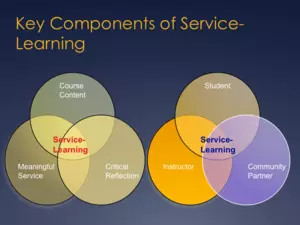What is Service-Learning?
"Service-learning is a form of experiential education where learning occurs through a cycle of action and reflection as students work with others through a process of applying what they are learning to community problems, and at the same time, reflecting upon their experience as they seek to achieve real objectives for the community and deeper understanding for themselves" Eyler and Giles, (1999).

Service-learning can be also be described by what it is not; it is NOT volunteerism, community service, internships, or field education. Field education and internships emphasize student learning: while students may provide valuable service, the objective is to provide students hands on experience to further their educational goals. Volunteerism and community service emphasize the service provided: the intended beneficiary is the service recipient (Furco 1996). So while service-learning share some of the components of volunteerism, community service, internships and field education, unlike these activities, service-learning applies equal focus to both learning and the service goals. It requires an academic context and is designed so that that the service and learning goals are mutually reinforcing. A useful distinction among service programs can be typified by whether the beneficiary is the recipient (community agency/member) or provider (student) or the focus is on learning or service.

